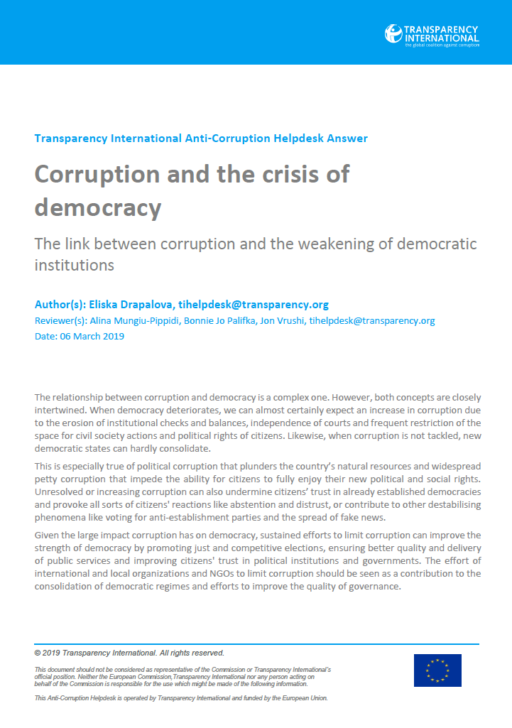
This Anti-Corruption Helpdesk brief was produced in response to a query from one of Transparency International’s national chapters. The Anti-Corruption Helpdesk is operated by Transparency International and funded by the European Union.
Query
What is the relationship between corruption and the crisis of democracy?
Summary
The relationship between corruption and democracy is a complex one. However, both concepts are closely intertwined. When democracy deteriorates, we can almost certainly expect an increase in corruption due to the erosion of institutional checks and balances, independence of courts and frequent restriction of the space for civil society actions and political rights of citizens. Likewise, when corruption is not tackled, new democratic states can hardly consolidate.
This is especially true of political corruption that plunders the country’s natural resources and widespread petty corruption that impede the ability for citizens to fully enjoy their new political and social rights. Unresolved or increasing corruption can also undermine citizens’ trust in already established democracies and provoke all sorts of citizens' reactions like abstention and distrust, or contribute to other destabilising phenomena like voting for anti-establishment parties and the spread of fake news.
Given the large impact corruption has on democracy, sustained efforts to limit corruption can improve the strength of democracy by promoting just and competitive elections, ensuring better quality and delivery of public services and improving citizens' trust in political institutions and governments. The effort of international and local organizations and NGOs to limit corruption should be seen as a contribution to the consolidation of democratic regimes and efforts to improve the quality of governance.
Contents
- What do we exactly mean by democracy?
- Can democracy contribute to tackling corruption?
- The limits of democracy on the control of corruption
- Can we talk about the crisis of democracy?
- How does corruption contribute to the crisis of democracy?
- Does control of corruption strengthen democracy?
- Conclusions
- References
Authors
Eliska Drapalova, [email protected]
Reviewers:
Alina Mungiu-Pippidi, Bonnie Jo Palifka and Jon Vrushi
Date
07/03/2019
Tags
 Download PDF
Download PDF
